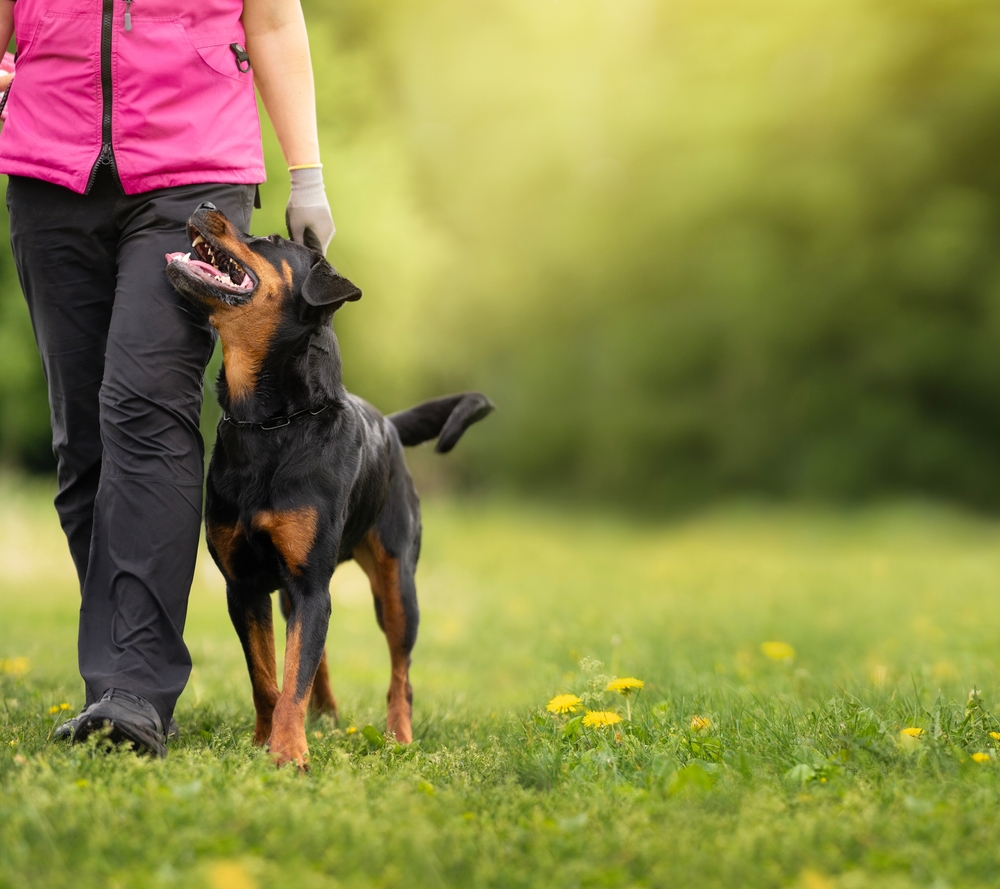
Training a Rottweiler is relatively straightforward due to the breed’s commitment to family and eagerness to please, but that doesn’t mean you have room to slack off. Derived from Roman Molossian war dogs, these large and powerful protectors will often become unmanageable if you don’t commit to training, potentially leading to severe consequences for you and others.
Over time, an inappropriate approach can make these dogs stubborn and unruly and make future attempts at training exponentially more difficult. To make life simple and ensure a happy relationship with your dog, we’ve broken down seven tips and tricks to train a Rottweiler to be an obedient, social companion you can appreciate every day.

The 7 Vet-Approved Tips and Tricks to Train a Rottweiler
1. Appreciate Them When They’re Young
Rottweilers can take 2 years to grow to their full size, but they’re undeniably massive by the time they reach 6 months. They typically exceed 60 pounds at this age, and if you haven’t done your due diligence in training obedience before then, you may find they’re challenging to handle.
Training should start the second you bring your Rottweiler puppy home from the breeder at 8–12 weeks.

2. Socialize Safely
Socialization is mission-critical during your dog’s first few months of life, but their unvaccinated bodies leave them prone to unnecessary infections, namely parvo and distemper. Your dog will receive three rounds of shots, but until they get their last one at 16 weeks, you must take extra precautions while taking them around others. Seven days after their first round of vaccinations, they can start controlled interactions with known, healthy, and vaccinated pets.
Tips for Safely Socializing Your Rottweiler
Avoid walking your dog in public areas or taking them to the dog park. Instead, set up playdates with vaccinated and well-socialized dogs, preferably in your home when your puppy is small, relatively harmless, and easy to control. Doing so will help them understand the concept of having others in their space.
Using a stroller or carrier, you can also take your Rottweiler puppy out in limited public places, such as your walking route or the vet. Though they generally shouldn’t touch the ground or make unnecessary contact with people or animals, the risk of not socializing your dog is too significant to dismiss.
You can talk to your vet about disease risks in your area and how you can socialize your Rottie safely.
💛 🐶 Speak To a Vet Online From the Comfort of Your Couch!

If you need to speak with a vet but can’t get to one, head over to PangoVet. It’s an online service where you can talk to a vet online and get the personalized advice you need for your pet — all at an affordable price!
3. Train Basic Obedience
Obedience commands like sit, down, stay, and recall will open up more training opportunities and lay the foundation for a cooperative dynamic. Start training as early as possible.
Make your daily sessions short and fun so your dog doesn’t tire of them. With the basic commands in place, you can expand on your training and begin teaching desirable habits in social settings.

4. Consider Puppy Classes
Another excellent idea when socializing your dog before they are fully vaccinated is to sign up for a puppy class. Most puppy classes require only the first or second round of shots.
In these sessions, your dog learns basic commands and enjoys an ideal socialization opportunity among peers in a safe setting. As the owner, you’ll also gain valuable training insights to use at home.
5. Forget Dominance, Focus on Consistency
A Rottweiler being dominant and wanting to be the alpha may be a dated idea, but they can still be pushy. Rottweilers are exceptionally bright, making them one of the more trainable breeds you’ll find. It also makes them clever opportunists who quickly learn how to get their way and how much they can get away with.
Rottweilers get motivation from what they want, typically choosing the path of least resistance and most enjoyment. If they get the go-ahead to do things their way, they’ll run with it. For owners trying to stem any unruliness, this requires setting boundaries and staying faultlessly consistent in the rules you enforce.
How to Establish Standards of Behavior
Talk with your family to ensure everyone is on the same page with house rules for your Rottweiler and how you handle your dog if they break them. Your Rottweiler must understand there is only one option, and it’s the standard you set.
If you only enforce rules sometimes, your dog will learn other ways to do things and try to take advantage of situations when possible. By being consistent, firm, and fair, you’ll establish yourself as a responsible leader your Rottweiler can rely on for guidance and security.
Establish boundaries and rules for behavior as soon as you get your Rottweiler home. By making them part of the everyday routine, your dog will be more likely to see them as natural to their life. You will subsequently have a much easier time enforcing the rules and positively reinforcing your dog’s behavior.

6. Provide Plenty of Exercise, and Find Fun Activities
Rottweilers are calmer, more compliant, and easier to train when they have adequate exercise and enrichment to let them release their energy. Walks and playtime in the yard are always valuable, but you can also test your dog’s athleticism and aptitude with sports.
Rottweilers can perform in numerous sports, such as obedience, tracking, scent work, or rally courses. Training in these settings enhances the dog-owner bond and harnesses the dog’s desire to work, making them happier and more obedient.
If your Rottweiler is still a young puppy when you enter competitive sports, ensure they aren’t doing strenuous activity. Growing bodies can get injured easily, and you don’t want to overexert your pup.
7. Train Your Rottweiler “Nothing in Life Is Free”
Whether you call it “Nothing in life is free” or “learn to earn,” the idea behind these popular training methods is to have your dog work for everything you give them. It’s the Premack principle in action. You ask your dog to do a low-probability behavior (one they’d be less likely to do when given the option) and reward them by letting them do a high-probability behavior.
An example might include asking your dog to sit and stay before taking them out for a walk. Whenever your dog wants something, have them perform a simple job to earn it.
Practicing this throughout the day will solidify your position as your Rottweiler’s leader and make them more likely to look to you for direction. At the same time, it teaches patience, reinforces commands, and rewards obedient behavior, supporting a calm, compliant demeanor with each use.


Final Thoughts
Rottweilers aren’t a top choice for first-time owners, but their intelligence and loyalty to their family make them one of the more trainable breeds around. Your experience with them will primarily depend on your approach. When you promote an atmosphere of respect and a commitment to reliable, positive guidance, your Rottweiler training routine can be as efficient as it is delightful for you and your dog.
Featured Image Credit: Katrina B, Pixabay


